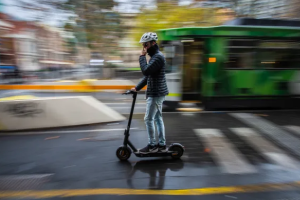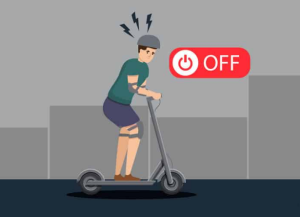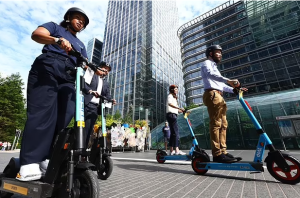Avoid using phones, ignoring traffic laws, double riding, neglecting helmet use, and charging unsafely.
Safety Precautions
Ignoring Helmet Use
Wearing a helmet while riding an electric scooter significantly reduces the risk of head injuries. Studies show that helmeted riders are 65% less likely to suffer a head injury during an accident compared to those without helmets. Despite this, many riders choose to ignore helmet use, exposing themselves to severe risks. Helmets should meet safety standards, such as those set by the CPSC, and fit properly to offer maximum protection.
Neglecting Traffic Signals
Adhering to traffic signals is crucial for the safety of electric scooter riders and those around them. Ignoring red lights or stop signs can lead to collisions with vehicles and pedestrians. Data indicates that a significant portion of electric scooter accidents involve a failure to obey traffic signals, emphasizing the need for riders to be vigilant and comply with road rules to prevent accidents.
Overlooking Local Laws
Local laws governing electric scooter use vary widely and may include speed limits, age restrictions, and designated riding areas. Riders who overlook these regulations not only risk fines but also contribute to unsafe riding conditions. Some areas restrict electric scooters to speeds no greater than 15 mph to ensure pedestrian safety. Violating these regulations can lead to dangerous interactions with traffic and pedestrians, underscoring the importance of familiarizing oneself with and adhering to local laws.
By focusing on these safety precautions, electric scooter riders can significantly reduce their risk of accidents and injuries, contributing to a safer environment for everyone.
Riding Etiquette
Riding on Sidewalks
Riding electric scooters on sidewalks can create hazardous conditions for pedestrians, especially in crowded urban areas. Pedestrian zones are primarily designed for walking speeds, and introducing vehicles like electric scooters can lead to conflicts and accidents. Some cities have implemented regulations that prohibit the use of electric scooters on sidewalks, directing riders to use bike lanes or roads where available. It’s crucial for riders to be aware of local ordinances to ensure they’re not posing a risk to pedestrians or themselves. The presence of electric scooters on sidewalks has been shown to increase the likelihood of pedestrian collisions.
Double Riding
Electric scooters are typically designed for single riders, with a specific weight limit and balance specifications. Double riding can significantly reduce the scooter’s stability and control, increasing the risk of accidents. Iit can strain the scooter’s motor and battery, leading to decreased performance and potentially shorter lifespan of the vehicle. Riders should adhere to the manufacturer’s guidelines, which usually discourage carrying passengers. Ignoring these guidelines not only compromises safety but also affects the scooter’s efficiency and durability.
Adhering to riding etiquette is not only about following laws but also about respecting the safety and comfort of all road users, including pedestrians. By practicing good etiquette, electric scooter users contribute to a safer and more harmonious urban environment.
Maintenance Missteps
Skipping Regular Checks
Neglecting regular maintenance checks on electric scooters can lead to a decline in performance and potentially hazardous situations. Regular inspections ensure that critical components such as brakes, tires, and batteries are in optimal condition. Tires with insufficient air pressure can significantly reduce the scooter’s stability and increase the risk of accidents. Manufacturers often recommend weekly checks to ensure the vehicle’s safety and efficiency. Ignoring these recommendations can result in unexpected malfunctions and could compromise the rider’s safety.
Using Non-standard Chargers
Using non-standard chargers for electric scooters can severely affect the battery’s lifespan and performance. Standard chargers are designed to match the battery’s specific voltage and current requirements, ensuring safe and efficient charging cycles. Non-standard chargers may not comply with these specifications, potentially leading to overheating, battery damage, or even fire risks. It’s crucial for users to adhere to the manufacturer’s guidelines regarding battery charging to avoid these risks. Battery performance is a key aspect of electric scooter maintenance, and using the correct charger can extend the battery’s lifespan and maintain the scooter’s range and speed.
Adopting a proactive approach to electric scooter maintenance, including regular checks and using standard chargers, is essential for ensuring the vehicle’s longevity and rider safety. These practices not only prevent accidents but also contribute to a more reliable and enjoyable riding experience.
Battery and Charging
Leaving Battery Drained
Allowing the battery to remain drained for extended periods can significantly reduce its overall lifespan and efficiency. Electric scooter batteries are typically lithium-ion, which can suffer from a decreased capacity when left discharged. Manufacturers recommend maintaining a charge level between 20% and 80% to optimize battery health. Regularly allowing the battery to fall below 20% without recharging can lead to a condition known as deep discharge, which may permanently affect the battery’s ability to hold a charge. Ensuring the battery is adequately charged before storage not only extends its life but also ensures the scooter is ready for use when needed.
Charging Overnight Unsupervised
Charging electric scooters overnight without supervision is a common practice that poses safety risks, including the potential for overheating and fire. Manufacturers design chargers to prevent overcharging, but malfunctions can occur, leading to dangerous situations. It’s advisable to charge the scooter during the day or when someone is available to monitor the charging process. This approach helps prevent accidents and ensures the battery maintains optimal health. If overnight charging is necessary, using a high-quality charger with safety features such as auto shut-off can mitigate some risks. aution and periodic monitoring are always recommended to ensure safety.
Personal Safety
Using Phones While Riding
Using a phone while riding an electric scooter significantly increases the risk of accidents. Distractions from phone use, such as texting or browsing, can lead to a loss of control, as the rider’s attention is diverted from the road. Studies have shown that distracted riding can double the chances of an accident, similar to the effects of distracted driving in automobiles. To maintain safety, riders should stop in a safe location if they need to use their phone, ensuring they do not compromise their attention to the road and surroundings.
Headphone Use in Traffic
Wearing headphones in traffic isolates riders from their environment, making it difficult to hear approaching vehicles, emergency signals, or pedestrian movements. This isolation can result in delayed reactions to potential hazards. For optimal safety, riders should either avoid using headphones altogether when in traffic or use a single earbud to keep the other ear open to ambient sounds. This compromise allows for some level of entertainment or communication without significantly impairing the rider’s ability to respond to auditory cues in their environment.



